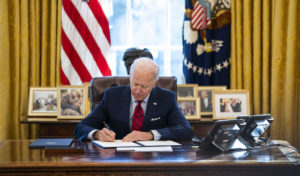
South Korea takes steps to regulate cryptocurrency amid speculation concerns.
The value of Bitcoin—the world’s most widely known and traded cryptocurrency—skyrocketed over the course of 2017, growing from a value of $973 per “coin” to a peak at year’s end of $19,666, twenty times its value. With its explosive growth, this once-niche digital currency has helped many people make extraordinary returns on their investments in Bitcoin, even making millionaires of a fortunate few.
But this same explosion in the value and usage of Bitcoin has brought the virtual product to the attention of regulators around the world—most recently to those in South Korea. The South Korean government reportedly announced that it will begin regulating cryptocurrencies like Bitcoin through a ban on anonymous cryptocurrency trading.
According to a statement reportedly made by Hong Nam-Ki, minister of South Korea’s Office for Government Policy Coordination, the new measures only allow the use of accounts associated with real-name bank accounts at virtual currency exchanges, which will effectively ban the use of anonymous accounts during cryptocurrency trading. In addition, the government provided banks guidelines to ensure that they conduct enhanced due diligence in cryptocurrency transactions. These guidelines require banks to verify additional information for cryptocurrency exchanges, including the source of the money, and whether the exchanges can verify their users’ identification. The changes are enacted under the authority of South Korea’s Financial Services Commission.
Cryptocurrencies like Bitcoin are digital tokens without any sort of physical or governmental backing, which computers electronically send to one another. Bitcoin uses an online structure that relies on a network of thousands of privately owned computers around the world to maintain and process all Bitcoin-related transactions. Anyone can open a Bitcoin account without giving a name, address, or any other identifying information. These characteristics make it difficult for any single entity, like a government or bank, to manipulate or interfere with the currency.
Cryptocurrencies are popular in South Korea, where about 20 percent of global Bitcoin transactions occur. An estimated one million South Koreans own shares of the virtual currency. Furthermore, demand in South Korea for Bitcoin has pushed the price per coin 30 percent higher than prevailing international rates.
The relatively widespread adoption of Bitcoin in South Korea, along with its historically high price, concerns the country’s regulators, who cite the dangers of “blind speculation” and “excessive volatility” as grounds for the forthcoming policy shift.
In a statement, the South Korean government worried that “virtual currency trading is overheating irrationally… And we can no longer overlook this abnormal speculative situation.”
Indeed, several commentators have noted that, despite Bitcoin’s upward trend, the cryptocurrency has also experienced extreme price fluctuations, sometimes dipping several thousand dollars in a single day before rising again. Moreover, after South Korea announced its ban on anonymous trading, the price per coin dropped more than 9 percent overnight to around $14,000—a reflection of the currency’s volatility.
For this reason, Stephen Roach, an economist and Yale University senior fellow, has reportedly warned that Bitcoin is experiencing “a dangerous speculative bubble by any shadow or stretch of the imagination…and like all bubbles, they burst.”
Regulators in other countries are also monitoring the burgeoning cryptocurrency market. In the United States, Jay Clayton, Chairman of the U.S. Securities and Exchange Commission, has warned investors of potential scams and criminal activity arising from the decentralized and unregulated nature of cryptocurrency, reportedly stating that the market does not have “the important disclosures, processes and other investor protections that our securities laws require.”
The United Kingdom (UK) and European Union (EU) are also considering regulating cryptocurrency in the wake of its growth over the past year. Citing potential connections between cryptocurrencies and criminal activities such as money laundering and tax evasion, the UK’s Treasury stated that it would work in tandem with EU governments to bring virtual currency exchanges within anti-money laundering and counter-terrorism financing regulation.
Along the lines of South Korea’s recent policy shift, an EU-wide plan would require cryptocurrency traders to disclose their identities, thus removing the anonymity that makes the virtual currency attractive to criminals.
Although “Bitcoin certainly fits the criterion” for a bubble asset susceptible to a market crash, according to some observers, many investors argue that the price of the coin will continue to rise. Thus, these observers view the currency’s volatility “as a necessary bump on the path to even higher valuations.”
The South Korean government’s ban on anonymous cryptocurrency trading came into effect on January 30, 2018.



